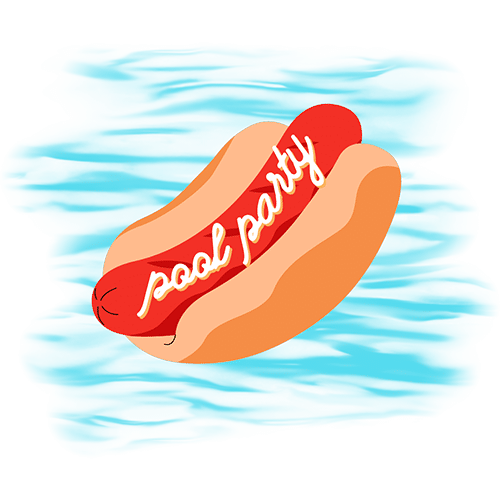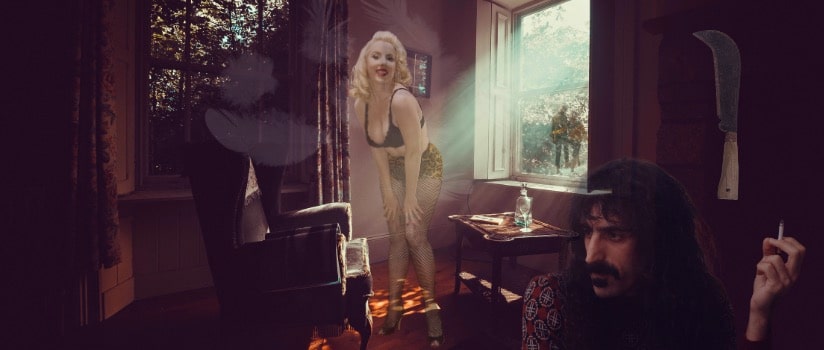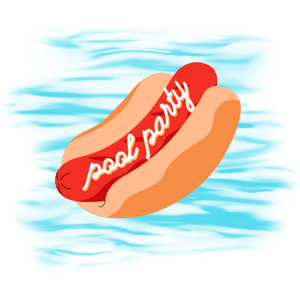A Ghost Like You
I knew Paula was lying about the way Bruce had died.
She claimed he’d become so depressed that he retreated to his bed and did not eat or drink for many days. When his friends’ calls went unanswered, one of them went to check on him and found him barely conscious, lying in urine-soaked sheets. As we spoke, I heard the line crackle. We were both on the edge of cell service areas. Paula cleared her throat and continued, “Our friend rushed him to the hospital, and he died of liver failure a few days later. It’s all very sad. He would have been 71 next month.”
The call dropped. I called her back to express my sympathy. What I wanted to ask next was, how could he possibly just stop eating and drinking? That’s certainly a long, lonely way to die. Instead, I asked whether Bruce had always struggled with depression or if it had been sudden. I heard in her voice how she was crumpling up the truth, letting it ricochet around her mouth until she’d smoothed and spat it out, jagged creases still discernible, “Bruce was an artist and musician… always looking for a laugh…though we sometimes worried about how isolated he was. Thankfully… he died IN the hospital, not at home…our friend found him just in time.”
But there was no reason to lie about where he had passed. I was standing in his living room, and his spirit clung to the house like the sticky residue of his cigar smoke. Pins pricked the back of my neck, there was a persistent feeling of being watched even while surrounded by thousands of acres of forest, and the house itself seemed to be holding its breath. I knew he had died here, and more desperately than she described, as a witness would soon confirm.
We ended the call, and I walked around Bruce’s house, threading together the last few weeks and months of a stranger’s life. Paula had asked me to come evaluate and possibly list the house. “It’s an artistic place and you’re a musician right? Maybe you’ll want to buy it yourself?” she’d added coyly.
The home was built in 1911 in the Craftsman style—box beam ceilings and window trim stained mahogany; leaded windows with wavy, original glass; huge, covered front porch complete with porch swing overlooking the river. There was a grand piano instead of a table in the dining room, and a collection of thousands of records where the china would have been. Astrud Gilberto and Frank Zappa pulled out and leaned against the turntable. The rooms were painted in garishly bright colors: dining room lime green, living room canary yellow, bedrooms tangerine orange, and bathrooms teal blue.
I entered the living room and admired the grand, stone fireplace made of glistening river rock, including a few clam shells embedded in the schmear. Above the mantel stared his mask collection, brightly colored and carved into various frightening and agonizing expressions. His couch sat under the window, covered completely by vintage Mexican blankets hiding the stains from raucous, bygone nights. At the center of the room was a round, wooden coffee table—that soft edge, yet chunky look of the late 70s—crowded with books, remotes, reading glasses all askew, and a New Yorker magazine opened to an article chronicling the murder of George Floyd. On the side table rested his pipe and ashtray, both full, beside the antique, milk-glass lamp, crystals dangling from the shade. His well-worn slippers tucked neatly below one of the bamboo chairs, which sat in conversation with the couch on either side.
Paula and Bruce were bona fide flower children. They’d met in the late sixties at a hippie commune in Northern California where they’d both moved to live out their anti-war, free-love ideologies. Emphasis on the free-love. Paula once told me the story of how she’d developed cold sores on her mouth after going down on a man with visible, open herpes sores on his member. “I just didn’t care, none of us did, now my lips tingle when they get too much sun, but I don’t regret a thing.” She giggled, eyes sparkling, and added, “I guess we really did share everything. Pretty far out stuff! You’d have to be there to understand. It was the future.”
Their love affair had lasted beyond the posted notice from the county that the commune would be shut down due to health code violations. So began a life-long dance of separating then co-existing, choosing other partners and then each other, and then others and then each other once again. There were entire decades where they lived states apart, but at the time of his death, Bruce had for years been living in a quiet, coastal Oregon town where he could enjoy the river and his piano in peace, and Paula had moved back to Oregon to be nearer to her son a mere two weeks prior.
She had found my number on Zillow when searching for realtors and called to tell me she had $200,000 and wanted to move to Portland. Could I help her? I found a suitable home on the outskirts and negotiated it down to $176,000, leaving her just enough money to paint and have new flooring installed. Little did she know, she was about to inherit a house at the beach.
I sunk into the low couch and looked up at a series of possible self-portraits pinned to one of the beams that divided the living and dining room ceilings. It looked like the photos of Bruce I’d seen on the walls, but sketched in pencil and caricature-like. It reminded me of similar series I’d seen of artists who would draw while under the influence of different drugs.
It felt like I had entered an altered state merely by sitting in this room. He was still here. And somehow, time bent in this place.
On my way down the hall, I paused to look at a small, framed photo of a smiling woman hanging above the thermostat. The bottom of the frame was resting on the thermostat at an angle, and it looked like something was behind it. I flipped it over to find a pasted magazine cut-out of a blonde woman with red polished nails swallowing a pulsating, enormous cock. Turning it back to the front, I took a photo of the smiling woman and sent it to Paula asking if she knew who it was. She responded, “His ex, the person he was with when he wasn’t with me.”
I went down the hallway into the study, a cavernous room with nearly floor-to-ceiling windows on the east side looking out to massive rhododendrons, covered in moss. To the left and right were floor-to-ceiling bookcases, bursting at the seams. Sweet tobacco smoke emanated from the snuff box in the corner, for a moment drowning out the acrid smell of past-smoked cigars. Naked women adorned antique calendars on the one free wall. Paul Theroux, Anais Nin, Franz Kafka, Orson Welles, Joan Didion, Aldous Huxley, Ayn Rand, perched and wondering. I could feel it most strongly here, his dissatisfaction with everything, but most especially his own life.
I looked more closely at the titles on the shelves. Interspersed between the philosophy, filmmaker bios, art critiques and psychedelic medicine books were, The Mammoth Book of Murder, Cannibal, What happened to Sharon Tate?, The Encyclopedia of Mass Murder, Serial Killers Among Us, Short Lives. I opened the closet to find shelves of horror-genre VHS tapes and DVDs and a few pornographic films with titles like Necromania & A Woman’s Torment.
Next to the computer was a photo of the same smiling woman. A roll of John Kerry 2004 stickers stuck out from the wooden cubbies beside the computer, and the beginnings of a letter, crossed out, began again,
“Dear Susan, I know I’ve hurt you
in more ways than anyone deserves
deeply, and perhaps irrevocably. It is not easy knowing how different it could have been
Losing you is one of the great regrets of my life. I know what I’m asking is difficult
Could you ever forgive me?
I’m sorry, I miss you. I would do anything to make it right between us again. I know it’s been years, but at one point, we were all we wanted. I’m getting too old for someday. Could I see you soon?”
I suddenly felt a grating, angry presence all around me and inside of me. A reverberation through space and time growling and striking out at me, demanding that I leave. My little dog, who had been following me from room to room, started barking uncontrollably. I whisked him out of the room and outside for some fresh air.
The January sun shone, reflecting through the water droplets on the ferns and trees. A blushing rose bush held a few brave blooms, and the water rushed down the creek and into the river. Peace. Harmony. Escape. Everything that led Bruce here, everything that led me to realizing, suddenly, that I wanted to own this house, not help list it. Ghost withstanding. I called Paula again and asked if I could buy this home on contract, as-is, with $100,000 down. She said she’d think about it.
“Will you take care of the garden? The roses need attention. And invite other artists to use the space?”
I replied, “Yes, most definitely, and Bruce may stay as long as he wishes. He won’t be scaring me off, that’s for sure.”
Residing with ghosts isn’t how I imagined it nor how the movies led me to believe it would be. Bruce occupied every room of the house, not just one portion of it, and we bumped up against one another, living out our experiences in different dimensions. When I played the piano, I heard and felt him grumbling with frustration and envy from the hallway. I’d simply say out loud, “Thank you Bruce for this gorgeous piano, I know you’d rather be playing it right now, but I promise to love it as you do. We’re taking turns.” I’d feel his grumbling dissipate into begrudging acceptance and his presence shift to another part of the house.
He primarily communicated with me through dreams. Most often, vivid, blood-soaked nightmares. A chicken with its head cut off is running in circles around a dusty, sepia-toned yard. An older gentleman in a bowler hat puts a wooden chair in the middle of the yard and sits to smoke a pipe. He counts the seconds on his pocket watch while a toddling Bruce must catch the headless chicken and remove its feathers. With every failed attempt, the man in the bowler hat strikes the child with a large machete, removing a limb and flinging it out of frame. When Bruce is reduced to a bloody stump, the man cradles him, kisses the top of his head and places him in a picnic basket, calmly cleans out his pipe, places it in his breast pocket, and carts the hemorrhaging child out of frame.
Paula and her son came for a visit. I’d found a picture of them on the fridge and had put together a box of items I was sure they’d like to keep. Her young-adult son Robby seemed visibly uncomfortable to be here. I asked if I could get them something to drink. Robby said, “No thanks, I don’t want to stay long. I forgot how many bad memories I have here.” Paula said, “Oh come on, it wasn’t that bad. We had lots of good times outside tending the garden.”
“YOU had a good time in the garden. I was constantly trying to hide from drunk Bruce and all of his meanness. Don’t you remember when he tried to kill us all on our way to dinner just because you said you were hungry and wanted to get going? I thought he was going to drive us off a cliff! He didn’t care when I said I was terrified, he drove faster.”
“Oh you’re misremembering, we had some good times, he wasn’t all bad.”
They barely stayed 15 minutes and didn’t want the box.
I began poking in his roll-top desk, one of the last places left to clean out. Bank statements, tax returns, and thousands of envelopes from “Stafford Enterprises” all filled with check stubs: $1,356.35 here, $2,187.41 there. Turns out Bruce was a trust fund baby. His father struck it rich in the oil fields of Texas. I found his college transcripts: 1966-1970 at the University of California, Berkeley, major in Jazz Piano, minor in philosophy. Mostly Bs with some Cs and As sprinkled in. At the back of the smallest cubby was a swollen, small envelope with a cassette tape inside. Dated July 19th, 1985 from “Matty,” the letter reads: “I want to thank you so much for giving me a present which has added so much to my life — one of the best presents I’ve ever had—telling people about you and your house and about how you gave me the Rhodes piano is one of my favorite stories and one which I’ll never forget…”
The oil furnace in the basement was installed in 1939 and still roared like a champ, but had developed a slight whine and needed a tune-up. I called the local HVAC company, and when the old-timer technician arrived, he said, “Well shoot, I remember this house. This is where we found him. I came for a scheduled maintenance and he didn’t come to the door. Something seemed off, called the police for a welfare check and well, he died in that back room there, surrounded by pills and booze. Nice guy, that Bruce. Little eccentric and rough around the edges, but underneath it all he had a good heart. He just didn’t want everyone to know.”
Three years after Bruce’s death, I received a call from Paula. “It’s cancer, and the chemo stopped working. Doctors say I have 3-6 months to live. It’s come out of nowhere Kate, I think he wants me with him.” She was gone ten weeks later.
The morning after her passing, I woke up to an empty house. Bruce was no longer glowering from room to room, filling the space with regret and apprehension. He’d moved on, suddenly and finally the house was mine.
That night I dreamed of laughter tittering from the gardens. Paula was bent over a hydrangea bush, arranging a bouquet and beckoning Bruce to join her. They were nude, with lithe, sun-kissed skin, ripe blackberry aroma wafting on the summer breeze. He greeted her with a smack on the rear and she threw the bouquet, wrestling him down to the grassy river bank where they fucked mercilessly, their moans echoing through the ravine.
- A Ghost Like You - April 30, 2025
* This is a work of fiction. Names, characters, places, and incidents are producs of the author's imagination. Any resemblance to real events or persons, living or dead, is entirely coincidental.




